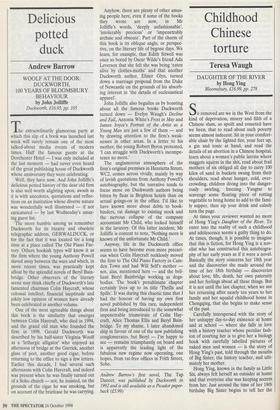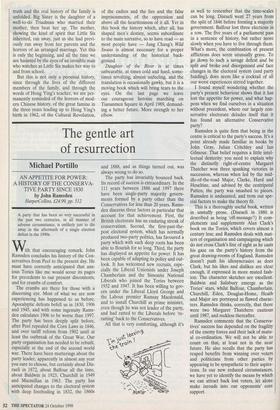Childhood Chinese torture
Teresa Waugh
DAUGHTER OF THE RIVER by Hong Ying Bloomsbury, £16.99, pp. 278 So removed are we in the West from the kind of deprivation, misery and filth of a Chinese slum, so spoilt and cosseted have we been, that to read about such poverty seems almost indecent. Sit in your comfort- able chair by the lighted fire, your feet up, a gin and tonic at hand, and read the details of an abortion in a Chinese hospital, learn about a women's public latrine where maggots squirm in the shit, read about frail mothers of six obliged all day to carry 100 kilos of sand in buckets swung from their shoulders, read about hunger, cold, over- crowding, children diving into the danger- ously swirling, freezing Yangtse to scavenge some floating piece of rotting vegetable to bring home to add to the fami- ly supper, then sip your drink and calmly turn the page.
At times your reviewer wanted no more of Hong Ying's Daughter of the River. To enter into the reality of such a childhood and adolescence seems a guilty thing to do. At times, though, it is possible to imagine that this is fiction, for Hong Ying is a nov- elist who has constructed this autobiogra- phy of her early years as if it were a novel. Basically the story concerns her 18th year and the discoveries she made around the time of her 18th birthday — discoveries about love, life, death, her own paternity and her feelings about all these things. But it is not until the last chapter, when we see her returning after nearly ten years to her family and her squalid childhood home in Chongqing, that she begins to make sense of the past. Carefully interspersed with the story of her unhappy day-to-day existence at home and at school — where she falls in love with a history teacher whose peculiar fash- ion of courting her is to give her a biology book with carefully labelled pictures of naked men and women — is the story of Hong Ying's past, told through the mouths of Big Sister, the history teacher, and ulti- mately her mother. Hong Ying, known in the family as Little Six, always felt herself an outsider at home and that everyone else was keeping secrets from her. Just around the time of her 18th birthday Big Sister begins to tell her the truth and the real history of the family is unfolded. Big Sister is the daughter of a well-to-do Triadman who married their mother, then beat her up. The mother, showing the kind of spirit that Little Six inherited, ran away, just as she had previ- ously run away from her parents and the horrors of an arranged marriage. Yet this is only the beginning, and all the time we are haunted by the eyes of an invisible man who watches as Little Six makes her way to and from school.
But this is not only a personal history, since through the lives of the different members of the family, and through the words of Hong Ying's teacher, we are per- manently reminded of the horrors of mod- ern Chinese history, of the great famine in the three years leading up to Hong Ying's birth in 1962, of the Cultural Revolution, of the cadres and the lies and the false imprisonments, of the oppression and above all the heartlessness of it all. Yet in this book the history which, after all, has shaped men's destiny, seems subordinate to the main narrative, so to have read — as most people have — Jung Chang's Wild Swans is almost necessary for a proper understanding of the historical back- ground.
Daughter of the River is at times unbearable, at times cold and hard, some- times revolting, almost unfeeling, and the translation is occasionally gawky, but it is a moving book which will bring tears to the eyes. On the last page we leave our courageous heroine marching on Tiananmen Square in April 1989, demand- ing a better future. More strength to her elbow.



















































































 Previous page
Previous page